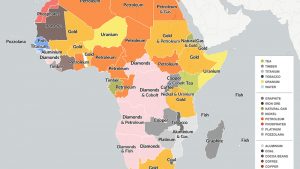 Accra, Ghana, November 1, 2017//-Africa’s middle class numbers more than 300 million by some estimates. This increasingly affluent and aspirational young cohort is driving a consumption revolution across the continent, increasing demand for consumer goods, technology and services.
Accra, Ghana, November 1, 2017//-Africa’s middle class numbers more than 300 million by some estimates. This increasingly affluent and aspirational young cohort is driving a consumption revolution across the continent, increasing demand for consumer goods, technology and services.
This is according to a latest report titled- ‘ Next-generation Africa-GCC Business Ties in a Digital Economy’. The report is an Economist Intelligence Unit (EIU) report which was sponsored by Dubai Chamber of Commerce and Industry.
The report explores the perspectives of young entrepreneurs and investors in Africa and the Gulf Cooperation Council (GCC) countries on building business relationships, identifying challenges to overcome and spotting opportunities that await.
It is report is based on extensive desk research and in-depth interviews with entrepreneurs and investors in Africa and the GCC, with a focus on millennials. The interviews were conducted between June and August 2017.
In parallel, young business leaders in the Gulf Cooperation Council (GCC) countries are starting to look beyond the Middle East.
As GCC startups mature and Gulf investors seek more fertile opportunities abroad, entrepreneurs and investors are starting to eye the value of business links—and expansion—to sub-Saharan Africa.
This report presents the perspectives of the next generation of business leaders in Africa and the GCC, focusing on millennial entrepreneurs, against an evolving economic and technological backdrop.
It explores their approach to entrepreneurship and investment, and delves deeper into sectors of interest such as retail, financial services and renewable energy. There is room for growing business ties between the two regions if key hurdles can be overcome.
Key findings of the report
Young business leaders in the GCC and sub-Saharan Africa want flexibility and freedom in how they work. Entrepreneurship is an increasingly attractive career for millennials.
In a study of nine African countries, in only two did the proportion of young people engaged in some form of entrepreneurial activity dip below 25%.
Even employed millennials have an entrepreneurial streak and want to do business differently—they eschew hierarchy, favour flexibility and want to be empowered: “Everyone is a microentrepreneur,” Najla Al-Midfa, general manager of the Sharjah Entrepreneurship Centre (Sheraa) said.
Growing self-confidence is boosting the potential for homegrown solutions and South-South collaboration. Young business leaders in Africa and the GCC no longer look only to the West for inspiration and brands to import.
Increased access to the latest technologies enables them to develop products and services that meet the needs of their local and regional markets. Examples span sectors from financial services to restaurants. Entrepreneurs in these regions face similar challenges and share common characteristics—a recipe for increased collaboration.
Awareness of the opportunities for Africa-GCC business links is limited, but growing. As their businesses start to scale up, Gulf millennial leaders are preoccupied with expansion in their immediate neighbourhood.
For them, Africa remains, on the whole, the third phase of growth after the Middle East and Asia. Gulf private-equity investment in Africa is likewise currently a niche activity, dominated by a handful of funds.
However, experts claim that understanding of the potential power of Africa-Gulf market links is starting to tick up. Timing and information will shift the balance. Private capital that has flowed from Europe and North America into Africa over the past decade is now looking to exit, providing opportunities for Gulf investors.
Consumers, not commodities, are powering growth sectors in Africa. With consumer spending forecast to reach US$1.4trillion annually by 2020, longterm consumption trends make Africa an enticing prospect for young business leaders, despite the short-term challenges.
Africa’s emerging middle class is the key driver behind interest in sectors such as retail (particularly e-commerce), financial services, healthcare and education. Technology is the gateway to get goods and services into new hands.
The room for growth is vast: in South Africa, for example, e-commerce accounted for just 1% of overall retail last year. Financial technology is another promising sector that is poised to boost the fortunes of the continent’s small businesses.
The practical challenges remain real for entrepreneurs interested in the African market. Young Gulf business leaders must contend with volatile currencies, reluctant investors, the need to identify the right partners, and data gaps.
Unstable currencies have already hindered expansion plans for some, but in general plans to expand into Africa have not been abandoned as a result. Creating multi-country strategies, denominating sales and purchases in US dollars and plugging information gaps can all help to mitigate risk, experts advise.
African entrepreneurs are turning to the GCC for more than just capital. While the GCC is largely viewed as a source of capital by African startups, GCC investors and businesses have a lot more to offer in the way of knowledge-sharing on operational and legal strategies. The Gulf is also increasingly becoming a destination for African products and services, particularly in the retail and food sectors.
African Eye Report/ Economist Intelligence Unit


